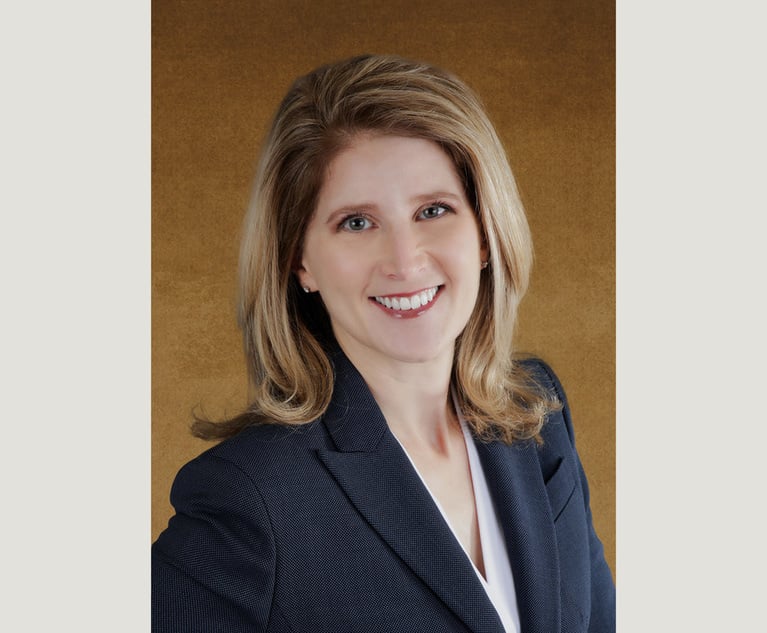A Unique Whistleblower: When In-House Attorneys Blow the Whistle
Imagine this scenario: An in-house attorney discovers company conduct in the regular course of business that she believes violates her ethical responsibilities as an attorney.
November 14, 2017 at 01:16 PM
8 minute read

Imagine this scenario: An in-house attorney discovers company conduct in the regular course of business that she believes violates her ethical responsibilities as an attorney. She drafts a legal memorandum to the Chief Executive Officer objecting to the conduct on ethical grounds. The company terminates her employment shortly thereafter. Can the in-house attorney sue for retaliatory discharge? If so, how can she prove her case if most of the relevant communications are protected from disclosure by the attorney client privilege? And how can the corporation defend against the retaliatory discharge claim without waiving the attorney-client privilege?
By way of background, the Model Rules of Professional Conduct do not prevent an in-house attorney from bringing a retaliatory discharge claim, see Model Rule of Professional Conduct Rule 1.6(b)(2). However, in pursuing these types of claims, in-house attorneys are confronted with two competing interests: the duty of confidentiality to their former client and their right to reveal information to the extent necessary to establish their claim against the former employer. Although the model rules permit in-house attorneys to pursue whistleblower claims, federal and state courts are still fleshing out the exact contours of what constitutes protected activity by in-house attorneys and how they can prove their claims in light of these competing interests.
Two recent cases shed light on whether refusing to violate ethical rules constitutes protected activity under state anti-retaliation law and to what extent, if any, an in-house attorney whistleblower may use confidential and protected information to establish her claims.
Refusing to Violate the Rules of Professional Conduct is Protected Activity under New Jersey's Conscientious Employee Protection Act
- Trzaska v. L'Oreal USA, 865 F.3d 155 (3d Cir. 2017), as amended (Aug. 22)
On July 25, 2017, the Third Circuit held that terminating an in-house attorney for refusing to violate the Rules of Professional Conduct can serve as a basis for a claim under New Jersey's Conscientious Employee Protection Act, N.J.S.A., Section 34:19-1 et seq. (CEPA). Steven Trzaska, a former in-house patent attorney at L'Oréal USA, Inc., is bound by the Rules of Professional Conduct established by the U.S. Patent and Trademark Office (USPTO) and by the Rules of Professional Conduct that circumscribe Trzaska's practice as a Pennsylvania attorney. Both forbid attorneys from “filing frivolous or bad-faith patent applications or from knowingly making false statements before a tribunal.” Trzaska alleged that L'Oreal established a patent application quota, and that due to a deficit in patentable products, Trzaska told management that he and his staff were unwilling to file patents they did not believe were patentable. L'Oréal offered Trzaska two severance packages a few weeks later. After rejecting both, Trzaska was terminated.
Following his termination, Trzaska brought a lawsuit against his former employer and its parent company, L'Oréal, S.A., for retaliatory discharge under CEPA. Specifically, he alleged that he was fired because he objected to and refused to draft and file patent applications for L'Oréal that he and his staff reasonably believed were not patentable. The District Court of New Jersey dismissed Trzaska's suit for failure to state a claim under Fed. R. Civ. P. 12(b)(6), finding that professional rules of conduct do not provide a source of authority for Trzaska's CEPA claim; and in any event, his allegations evidenced “nothing more than [Mr. Trzaska's] disagreement with his employer over the propriety of a quota for patent applications,” Trzaska v. L'Oreal USA, No. 215CV02713SDWSCM, 2015 WL 6687661, at *4 (D.N.J. Oct. 30, 2015).
The Third Circuit, reversing that decision, determined that the Rules of Professional Conduct do provide a source of authority enabling an in-house attorney to pursue claims of whistleblower retaliation against his or her employer under New Jersey's CEPA statute. First, the court reasoned that a well-functioning patent system, which is in the public's interest, cannot exist without adherence to the duties of candor and good faith that the USPTO imposes on all patent applicants. Second, it held that that “an allegation that an employer instructed, coerced, or threatened its patent attorney employees to disregard the [Rules of Professional Conduct] binding him violates a clear mandate of public policy” under CEPA, Trzaska v. L'Oreal USA, 865 F.3d 155, 160 (3d Cir. 2017), as amended (Aug. 22). Thus, the court held that Trzaska's claim could serve as the basis for a CEPA claim. The case was remanded.
Using Privileged Communications to Prove a Retaliatory Discharge Claim
- Wadler v. Bio-Rad Laboratories, 212 F.Supp.3d 829 (N.D. Cal. 2016)
Another recent case, Wadler v. Bio-Rad Laboratories, provides insight into whether and to what extent an in-house attorney may use privileged communications to prove a retaliatory discharge claim. In Wadler, the Bio-Rad Laboratories' (Bio-Rad) long-time general counsel brought a retaliatory discharge lawsuit against his former employer under, among other things, the anti-retaliation provisions of Sarbanes-Oxley Act and Dodd-Frank Act. He alleged that Bio-Rad terminated his employment because he was investigating potential Fraud Corrupt Practices Act (FCPA) violations and reported these violations to the Bio-Rad's audit committee because he believed the company was not taking reasonable steps to remedy the violations. Prior to trial, Bio-Rad sought to prevent Wadler from using documents and communications protected from disclosure by the attorney-client privilege to prove his whistleblower claim. At the core of this dispute was a PowerPoint presentation (DPW Presentation) created by Bio-Rad's outside counsel that was presented to the Securities and Exchange Commission (SEC) on behalf of Bio-Rad's audit committee which addressed Wadler's concerns about FCPA violations, documents underlying the DPW presentation, and a memorandum from Wadler to the audit committee about potential FCPA violations. Notably, before Wadler filed his lawsuit, the underlying FCPA violations were addressed in an administrative proceeding by the SEC and were the subject of Wadler's complaint with the Department of Labor (DOL) brought under the Sarbanes-Oxley Act.
The court concluded that Wadler “should be permitted to rely on privileged communications and confidential information that is reasonably necessary to any claim or defense in the case.” This included allowing Wadler to use privileged communications to prove that his protected activity was objectively reasonable, that he had a subjective belief that his concerns were legitimate, and to disprove Bio-Rad's alternative reasons for his termination. The court also went a step further, concluding that Bio-Rad waived the attorney-client privilege. The waiver specifically related to the DPW presentation, Wadler's memorandum, and declarations from Bio-Rad's management describing their interactions and communications with Wadler in order to offer an alternative reason for his termination. The court noted that because Bio-Rad had previously disclosed these documents in the SEC and DOL proceedings and throughout the litigation, the privilege had clearly been waived. Interestingly, the court held that the waiver also extended to communications relating to the same subject matter as the communications disclosed in the DPW presentation.
The case went to trial in February, and the jury entered a verdict awarding $8 million in damages to Wadler. On March 10, Bio-Rad filed a Motion for Judgment as a matter of law and a motion for a new trial, arguing that the evidence demonstrated that Wadler didn't actually believe the whistleblowing allegations he outlined in the memorandum he wrote to the Audit Committee, and that he had instead ignored explanations to the contrary. The district court denied both motions on May 10. Bio-Rad appealed the decision to the U.S. Court of Appeals for the Ninth Circuit, and the issues on appeal will be fully briefed by Nov. 6.
Lessons from 'Trzaska' and 'Wadler'
Trzaska and Wadler demonstrate a trend toward expanding whistleblower protections for in-house attorneys and speak to the extent an in-house attorney whistleblower may use privileged communications to establish her claim.
Employers should be aware that in-house counsel's internal disagreements with senior management over the legality of corporate conduct could be protected activity under both state and federal law. Employers should take all complaints and objections from in-house counsel, including those based on ethical or professional obligations, seriously because the objection may constitute protected activity in a retaliatory discharge claim. Likewise, the termination from employment of an in-house attorney who has been providing legal counsel in high risk matters is itself a high risk proposition.
Employers and outside counsel should also be aware that courts will likely permit privileged communications to be used by in-house attorney whistleblowers to establish their prima facie retaliation case and to disprove an employer's alternative reason for terminating the in-house attorney whistleblower. At the beginning of the litigation, employers should assess and develop a strategy regarding whether to produce and rely on relevant but privileged communications related to in-house whistleblowers claims. Wadler makes clear that if an employer produces or relies on privilege communications in other related proceedings or during discovery that the privilege may well be waived regarding the entire subject matter of the privileged communications.
Robert Goldich, a shareholder at Greenberg Traurig, focuses his practice on complex employment and class action litigation. Sarah Goodman is an associate at the firm. She represents employers against allegations of discrimination, harassment and retaliation in state and federal courts. Adam Roseman is an associate with the firm and focuses his practice on on federal and state labor and employment counseling and litigation.
This content has been archived. It is available through our partners, LexisNexis® and Bloomberg Law.
To view this content, please continue to their sites.
Not a Lexis Subscriber?
Subscribe Now
Not a Bloomberg Law Subscriber?
Subscribe Now
NOT FOR REPRINT
© 2025 ALM Global, LLC, All Rights Reserved. Request academic re-use from www.copyright.com. All other uses, submit a request to [email protected]. For more information visit Asset & Logo Licensing.
You Might Like
View All
Pa. Supreme Court to Decide Enforceability of 'Browsewrap' Arbitration Agreements
8 minute read
From a Mediator’s Perspective: Common Mis-steps That Parties Make at Mediation
6 minute readTrending Stories
- 1Who Are the Judges Assigned to Challenges to Trump’s Birthright Citizenship Order?
- 2Litigators of the Week: A Directed Verdict Win for Cisco in a West Texas Patent Case
- 3Litigator of the Week Runners-Up and Shout-Outs
- 4Womble Bond Becomes First Firm in UK to Roll Out AI Tool Firmwide
- 5Will a Market Dominated by Small- to Mid-Cap Deals Give Rise to a Dark Horse US Firm in China?
Who Got The Work
J. Brugh Lower of Gibbons has entered an appearance for industrial equipment supplier Devco Corporation in a pending trademark infringement lawsuit. The suit, accusing the defendant of selling knock-off Graco products, was filed Dec. 18 in New Jersey District Court by Rivkin Radler on behalf of Graco Inc. and Graco Minnesota. The case, assigned to U.S. District Judge Zahid N. Quraishi, is 3:24-cv-11294, Graco Inc. et al v. Devco Corporation.
Who Got The Work
Rebecca Maller-Stein and Kent A. Yalowitz of Arnold & Porter Kaye Scholer have entered their appearances for Hanaco Venture Capital and its executives, Lior Prosor and David Frankel, in a pending securities lawsuit. The action, filed on Dec. 24 in New York Southern District Court by Zell, Aron & Co. on behalf of Goldeneye Advisors, accuses the defendants of negligently and fraudulently managing the plaintiff's $1 million investment. The case, assigned to U.S. District Judge Vernon S. Broderick, is 1:24-cv-09918, Goldeneye Advisors, LLC v. Hanaco Venture Capital, Ltd. et al.
Who Got The Work
Attorneys from A&O Shearman has stepped in as defense counsel for Toronto-Dominion Bank and other defendants in a pending securities class action. The suit, filed Dec. 11 in New York Southern District Court by Bleichmar Fonti & Auld, accuses the defendants of concealing the bank's 'pervasive' deficiencies in regards to its compliance with the Bank Secrecy Act and the quality of its anti-money laundering controls. The case, assigned to U.S. District Judge Arun Subramanian, is 1:24-cv-09445, Gonzalez v. The Toronto-Dominion Bank et al.
Who Got The Work
Crown Castle International, a Pennsylvania company providing shared communications infrastructure, has turned to Luke D. Wolf of Gordon Rees Scully Mansukhani to fend off a pending breach-of-contract lawsuit. The court action, filed Nov. 25 in Michigan Eastern District Court by Hooper Hathaway PC on behalf of The Town Residences LLC, accuses Crown Castle of failing to transfer approximately $30,000 in utility payments from T-Mobile in breach of a roof-top lease and assignment agreement. The case, assigned to U.S. District Judge Susan K. Declercq, is 2:24-cv-13131, The Town Residences LLC v. T-Mobile US, Inc. et al.
Who Got The Work
Wilfred P. Coronato and Daniel M. Schwartz of McCarter & English have stepped in as defense counsel to Electrolux Home Products Inc. in a pending product liability lawsuit. The court action, filed Nov. 26 in New York Eastern District Court by Poulos Lopiccolo PC and Nagel Rice LLP on behalf of David Stern, alleges that the defendant's refrigerators’ drawers and shelving repeatedly break and fall apart within months after purchase. The case, assigned to U.S. District Judge Joan M. Azrack, is 2:24-cv-08204, Stern v. Electrolux Home Products, Inc.
Featured Firms
Law Offices of Gary Martin Hays & Associates, P.C.
(470) 294-1674
Law Offices of Mark E. Salomone
(857) 444-6468
Smith & Hassler
(713) 739-1250







